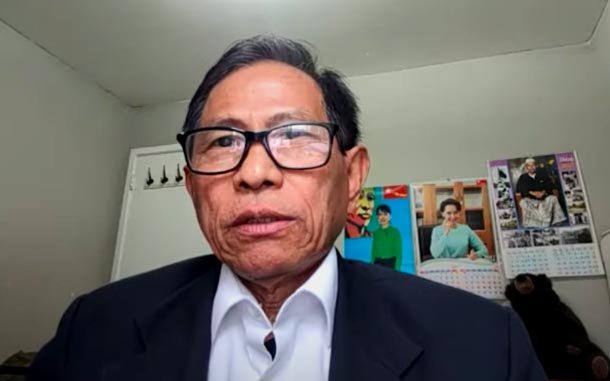Irrawaddy: In June, the United States leveled sanctions against two junta-controlled banks — Myanma Foreign Trade Bank and Myanma Investment and Commercial Bank — which conduct international transactions and supply US dollars to Myanmar’s regime.
Earlier this month the US deadline passed to wind down transactions with the two banks.
Singapore’s United Overseas Bank (UOB) announced that it will shut all of Myanmar junta-linked Myanmar Airways International bank accounts by August 15. The bank said it will restrict all transactions with Myanmar, stopping funds being moved only between UOB accounts.
Economist U Sein Htay has recently talked to The Irrawaddy about how the sanctions on the two banks will affect the regime.
U Sein Htay is a graduate of the Yangon University of Economics and was a member of the economic committee of the National League for Democracy government. He now lives in the US.
How will the sanctions impact the military regime?
They will bring more serious damage to the regime and slow its transactions.
There are international banks that deal with those two banks. I don’t know exactly which banks they deal with. But I guess they are linked with banks in Singapore, Thailand and China. The US has warned that it will take action against anyone that deals with the two banks.
The US may freeze money or adopt other action against any firm dealing with the banks.
The sanctions will impact those two banks but also anyone dealing with them. So you can imagine the impacts of the sanctions.
UOB recently said it will restrict all payments with accounts in Myanmar. Do you think banks in other countries will follow suit?
A bank that deals with these two banks has started to feel the impact. Like UOB, other banks that deal with the two sanctioned banks should have started to suffer.
There won’t be much impact on banks in Myanmar. The regime may shift accounts to domestic banks owned by military-linked cronies and continue to make transactions with foreign banks and potentially bypass sanctions.
This is an old method that dates back to [former military dictator] Than Shwe. These sanctions are, however, more severe and the regime might be getting desperate now.
Will the sanctions restrict the regime’s access to the foreign currency used to buy arms, jet fuel and imports for weapon production?
This is the main reason sanctions were imposed. The sanctions are not intended to harm Myanmar’s people. There would have been no sanctions if the foreign currency had been used to build roads, bridges, hospitals and schools and improve public services.
Min Aung Hlaing has killed civilians since he seized power in the 2021 coup. The killing of resistance fighters is understandable as there is ongoing fighting. But the regime has carried out indiscriminate attacks on civilians, torched villages and dropped bombs from aircraft.
Myanmar cannot produce jet fuel and imports it with foreign currency. If its access to foreign currency can be cut, airstrikes will drop. And it also has to import materials to produce weapons.
This also needs foreign currency. Oil and gas is the major source of income for the regime. The sanctions are intended to cut profits from the state-owned oil company, Myanma Oil and Gas Enterprise (MOGE).
How are the sanctions related to Burma Act?
The Burma Act is the part of National Defense Authorization Act. The US Treasury Department imposes sanctions as a tool for the act. The two banks were sanctioned as a consequence. The Burma Act was made possible by expats from Myanmar in the US. They called for action against Myanmar’s military, prompting US lawmakers to pass the Burma Act.
You said the regime might use domestic banks to make international transactions. Will that work?
People in Myanmar can report to us if there is evidence of that. We are aware of some transactions made through banks owned by cronies to banks in Thailand. According to my experience, the regime will mainly use Chinese banks for its international transactions.
The regime has been forced to sell bonds to cronies to cover a shortfall in the budget. Can this move help it in the long run?
It won’t. That’s why they have been forced to issue the 20,000 kyat note. It is testimony to the fact that the regime is facing a financial crisis. The consecration of the Buddha statue and the birthday of the white elephant calf is just used as an excuse for the note. The regime is facing a foreign currency crisis. Not only MOGE but trade has also been affected by sanctions.

